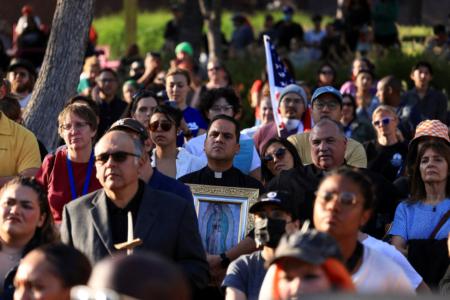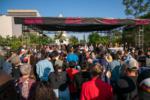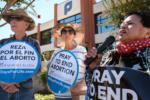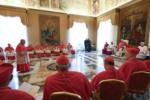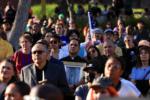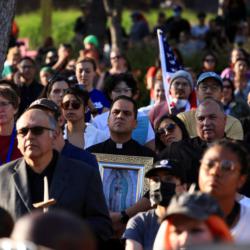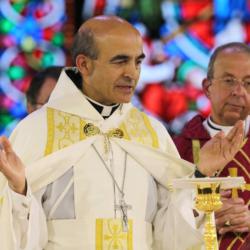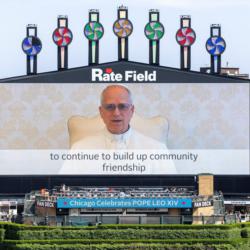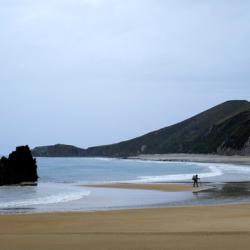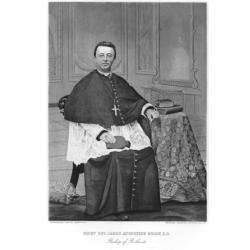Archdiocese has long ties to Catholic Relief Services' mission
BRAINTREE -- It's hard for Ken Hackett to think of the greatest challenge he experienced during his many years of service with Catholic Relief Services, including 18 as its president.
There was the 1984-85 famine in Ethiopia, where Hackett saw the emaciated bodies of children "laid out like cords of wood." There was the Rwandan genocide, the 2004 Indonesian tsunami, the 2010 Haiti earthquake, and countless wars, natural disasters, famines, and humanitarian crises in between. To him, no one crisis was more difficult than the other.
"They were all challenges, and it basically meant having good people respond cogently, smartly, and analytically to the situations they found in each place," Hackett said. "So the challenge for me as the director of the whole thing was finding good people, people who could respond properly."
During the Kosovo War, Catholic Relief Services was asked to build a shelter for 20,000 refugees. That number quickly became 40,000, then 60,000.
"We had to move people from around the world who had skills in various things into Macedonia for that response, and we did it in a matter of days," Hackett said. "That was one of the things that made, I think, CRS an important and a valuable organization, that the people were ready to go if they had to go."
Staff members would routinely leave their families for months on end to serve in the most dangerous locations on the planet.
"That was one of the strengths of our organization, was its people," Hackett said.
The history of Catholic Relief Services, the humanitarian agency of the U.S. Conference of Catholic Bishops, is a history of hope amid the worst tragedies of the past 82 years. Hackett, a native of West Roxbury, served as president of the organization from 1993 to 2011, leading 5,000 people working in over 100 countries. He also served as U.S. Ambassador to the Holy See from 2013 to 2017. He saw many things that disturbed and traumatized him. He saw beautiful things, too.
"If you look at it at the macro level, it's so much suffering," he said. "If you look at it at the micro level, and you see how people are striving to improve the life of themselves and their family, and the heroism that they exhibit and the strength of character. It really gives you a great feeling that the human condition is strong and the faith of the people, no matter what religion they are, is strong."
In 2024, CRS provided food, water, education, shelter, and healthcare to 198 million people in 93 countries.
"As Catholics, we are called to bring hope where there is despair, light where there is darkness, and healing where there is suffering," Boston Auxiliary Bishop Robert Reed, a member of the CRS board of directors, said in a statement. "CRS is one of the most powerful ways the church in the United States lives this call. Their mission is rooted in our faith, grounded in Catholic social teaching, and carried out with the highest standards of compassion, competence, and stewardship."
CRS began as War Relief Services, created by the U.S. Catholic bishops in 1943 to serve survivors and refugees of World War II. That same year, the Archdiocese of Boston's parishes began annual collections for CRS on Laetare Sunday, the fourth Sunday of Lent.
"Each year on Laetare Sunday, we have the opportunity to share in this heroic, charitable endeavor on behalf of Christ's brethren," Cardinal Richard Cushing said in 1960. "Hunger, deprivation, and the refugee problem are the hard facts that underline the appeal. Wherever in the world there is a hungry mouth, a disease-racked body, a homeless person, we must be there to minister to them."
The name and scope of CRS has changed, but the mission has remained the same: To serve those in need without discriminating based on race, religion, or nationality. The organization has established Catholic Charities outposts in dioceses throughout the world and has longstanding partnerships with local churches who know the language, culture, and needs of the community. In the Catholic Church, this empowering of local institutions is called "subsidiarity."
"By working through partners who are embedded in the local context, CRS ensures that aid is not only efficient -- it is respectful, responsive, and sustainable," Bishop Reed said. "It's not only more effective -- it's more human."
According to historical information provided by the Archdiocesan Archives, in 1945, the Archdiocese of Boston donated 467,380 pounds of clothes, shoes, and bedding to those affected by World War II. In 1946, the archdiocese raised 559,260 pounds of canned goods in eight days for the hungry people of post-war Europe. CRS went on to hold an annual nationwide Thanksgiving clothing drive from 1949 to the 1970s.
"The plaintive cry of these homeless and needy of Europe, the Near and Far East affords us an opportunity to express thanks to God for being spared untold hardships," Cardinal Cushing wrote in a 1949 message promoting the first clothing drive. "Christ our Lord will bless a hundredfold those who share his compassion by helping those suffering people in dire want."
CRS was present during the most seismic events of the next decades, including the Korean War, the Partition of India, and the Vietnam War. By the 1950s it had become one of the largest supporters of Mother Teresa's Missionaries of Charity and the largest private provider of food aid to the U.S. government.
Cardinal Cushing said in 1959 that CRS has "manifested by deed that the love of neighbor, motivated by the love of God, still burns brightly in the hearts of millions in spite of the cruelty and the callousness of the world in our day."
Bishop Reed said the organization's global presence promotes trust and respect of the U.S. worldwide.
"In a world that is more interconnected than ever, these relationships enhance America's global security and influence," he said.
A large part of CRS's ministry involves refugee resettlement. In 1948, Congress passed the Displaced Persons Act, which allowed European refugees to come to the U.S. Then-CRS Assistant Executive Director Msgr. Edward Swanstrom wrote a letter to Cardinal Cushing, asking him to personally appeal to House Republican Conference Chair Joseph Martin in support of the act.
At first, Cardinal Cushing was reluctant to support refugee resettlement because "our area is small and the communities do not seem adapted to an ambitious resettlement program." He later changed his mind, telling parishes to "do their part in promoting the reception and resettlement of the Displaced Persons." Every diocese in the U.S. appointed a resettlement director. By June 1949, the Archdiocese of Boston had sponsored 1,006 refugees -- 3.3 percent of all refugees sponsored by CRS.
Cardinal Cushing spoke out against the Immigration and Nationality Act of 1952, which would have restricted immigration and given the government more power to detain and deport "subversive" migrants. In 1955, 45 percent of refugee applications under the Refugee Relief Act of 1953 were submitted by CRS.
Bishop Reed said that Catholic social teaching instructs that "the dignity of human life knows no borders" and that the faithful have a responsibility to care for the "one human family."
"This is not a distant problem -- it affects us all," he said. "People don't flee violence, famine, or disaster by choice. They leave because they have no other option, because they are backed into a corner with nowhere else to turn."
In 1977, the U.S. bishops established Operation Rice Bowl, a Lenten program of prayer, fasting, and monetary donations to the hungry. In 1980, the Archdiocese of Boston donated $72,830 to Operation Rice Bowl. The archdiocese would raise $430,000 for relief efforts after the Rwandan genocide, and $442,000 after the 2021 Haiti earthquake.
"The archdiocese has always been a major supporter of the Catholic Relief Services," Hackett said, adding: "It's been really something that I'm very proud, as an original Bostonian, of what the archdiocese has done with Catholic Relief Services."
Growing up one of seven children in West Roxbury, Hackett said the Catholic Church was omnipresent in his childhood. He was an altar boy and played CYO basketball. A pastor was there at the start of every football game. He attended parochial school and Boston College High School, where he learned about the Jesuit tradition of service to others.
"We were always encouraged to help other people where we could, so it was just part of who we were," he said.
After university, Hackett served in the Peace Corps before joining Catholic Relief Services. His work began in the West African nation of Sierra Leone, where he saw "pretty pervasive poverty."
"People didn't have much except the will to do something good for themselves and their neighbor," he said.
CRS ran three programs in Sierra Leone: A school meal program serving 500,000 children enrolled in Catholic schools, a health education and vaccination program for mothers and their babies, and a leprosy control program.
"In addition to that, we supported communities in building wells and improving latrines and improving their lot -- helping them do it, not we doing it for them," Hackett said.
He estimated that he has been to 80 countries in his work with CRS. In all of them, he saw poverty, abuse of power, and marginalized people getting "the raw end of the deal." He also saw people take initiative to improve their lives. The character of the people he served changed his life.
"Their desire to improve their families and exploit opportunities and try, even when there was real difficulties, difficulties with income and difficulties with power, I would say, because there was a lot of corruption and a lot of mean things done to poor people in Sierra Leone, as well as with the other people," he said.
When he was in the Peace Corps, he served in a rural village in Ghana with a population of 250. He knew people who had only $10 to their name.
"You knew they had to do anything to survive, and if you could help them, that made their life just a little better," he said.
In the Philippines, he helped establish maternal and child health programs. The Mount Pinatubo eruption of 1991 wreaked havoc throughout the country. CRS was responsible for caring for those forced to flee their homes. The eruption was so massive that when Hackett returned to the Philippines in its aftermath, he opened his refrigerator and found volcanic ash inside. His time there also saw six coups and two dozen typhoons.
"The Philippines was an exciting place," he said, adding, "Filipinos are a wonderful, exuberant people who enjoy life. And it was a pleasure to work there."
His first child was born in the Philippines and his second was born in Kenya, where he was responsible for supervising CRS work in Ethiopia, Somalia, Uganda, Southern Sudan, Tanzania, and Madagascar. The work included antiretroviral therapy for HIV patients and agricultural programs to improve animal breeding in dry areas. He supervised CRS efforts in Somalia at the time of the Black Hawk Down incident, and in Rwanda just before the genocide.
CRS has been present in Rwanda since the early 1960s, providing food and education to the country's children. Hackett saw rising ethnic tensions, including a march of 60,000 people who had been forced out of their villages.
"I knew that something is going to happen here, and it did," he said. "And it happened with great ferocity. Our staff was traumatized. Some of them were killed. Those people who I knew and we worked with were killed. Their family were killed."
One senior CRS staff member was married to a Rwandan woman who lost 58 relatives in the genocide.
"It was personal for us," Hackett said. "We all had something in us from the experience of Rwanda."
CRS's work to rebuild the country started small. They instituted reconciliation programs advised by psychologists. Eighteen months after the genocide they brought counselors to communities, encouraging survivors to speak about what they saw.
"That in and of itself created all kinds of different reactions, but eventually it was very moving," Hackett said.
He saw one woman point at and identify the man who killed her husband before saying "I forgive you."
"That was shocking, and there were many examples like that, but it took time and patience, and it still goes on," he said. "There's still a lot of ingrained hatred in there, and one group using its power over another, but we remain trying to do what we can to support communities at the lowest level."
Currently, CRS is helping farmers grow food in Africa; providing education and job training in Asia and Latin America; bringing food and medical care to Ukraine and Gaza; providing water and shelter after disasters in Haiti and Sudan; and preventing malaria and cholera outbreaks all over the world.
Bishop Reed said that the faithful can help CRS by donating, praying, and educating themselves and others about the work the organization does.
"Jesus teaches us to love our neighbor -- and in today's world, that neighbor may be across the street or across the ocean," he said. "In supporting CRS, we are living the Gospel."
